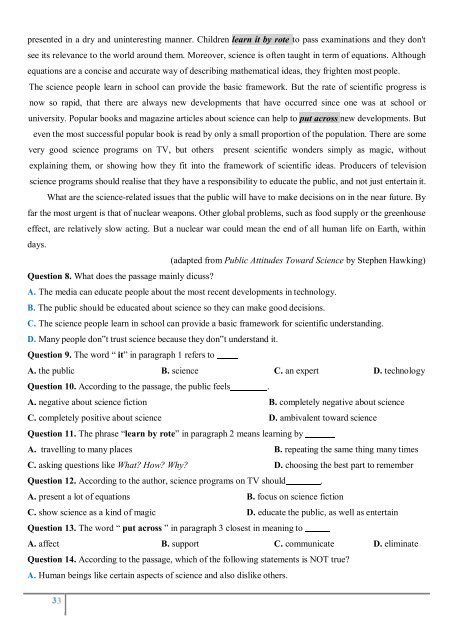12 đề thi thử THPT Quốc gia môn tiếng Anh năm 2018 có lời giải chi tiết
https://app.box.com/s/nnfa5e7e8wjt4ogw5c12nscparzxshyv
https://app.box.com/s/nnfa5e7e8wjt4ogw5c12nscparzxshyv
Create successful ePaper yourself
Turn your PDF publications into a flip-book with our unique Google optimized e-Paper software.
presented in a dry and uninteresting manner. Children learn it by rote to pass examinations and they don't<br />
see its relevance to the world around them. Moreover, science is often taught in term of equations. Although<br />
equations are a concise and accurate way of describing mathematical ideas, they frighten most people.<br />
The science people learn in school can provide the basic framework. But the rate of scientific progress is<br />
now so rapid, that there are always new developments that have occurred since one was at school or<br />
university. Popular books and magazine articles about science can help to put across new developments. But<br />
even the most successful popular book is read by only a small proportion of the population. There are some<br />
very good science programs on TV, but others present scientific wonders simply as magic, without<br />
explaining them, or showing how they fit into the framework of scientific ideas. Producers of television<br />
science programs should realise that they have a responsibility to educate the public, and not just entertain it.<br />
What are the science-related issues that the public will have to make decisions on in the near future. By<br />
far the most urgent is that of nuclear weapons. Other global problems, such as food supply or the greenhouse<br />
effect, are relatively slow acting. But a nuclear war could mean the end of all human life on Earth, wi<strong>thi</strong>n<br />
days.<br />
(adapted from Public Attitudes Toward Science by Stephen Hawking)<br />
Question 8. What does the passage mainly dicuss?<br />
A. The media can educate people about the most recent developments in technology.<br />
B. The public should be educated about science so they can make good decisions.<br />
C. The science people learn in school can provide a basic framework for scientific understanding.<br />
D. Many people don‟t trust science because they don‟t understand it.<br />
Question 9. The word “ it” in paragraph 1 refers to<br />
A. the public B. science C. an expert D. technology<br />
Question 10. According to the passage, the public feels .<br />
A. negative about science fiction B. completely negative about science<br />
C. completely positive about science D. ambivalent toward science<br />
Question 11. The phrase “learn by rote” in paragraph 2 means learning by<br />
A. travelling to many places B. repeating the same <strong>thi</strong>ng many times<br />
C. asking questions like What? How? Why? D. choosing the best part to remember<br />
Question <strong>12</strong>. According to the author, science programs on TV should .<br />
A. present a lot of equations B. focus on science fiction<br />
C. show science as a kind of magic D. educate the public, as well as entertain<br />
Question 13. The word “ put across ” in paragraph 3 closest in meaning to<br />
A. affect B. support C. communicate D. eliminate<br />
Question 14. According to the passage, which of the following statements is NOT true?<br />
A. Human beings like certain aspects of science and also dislike others.<br />
3

















